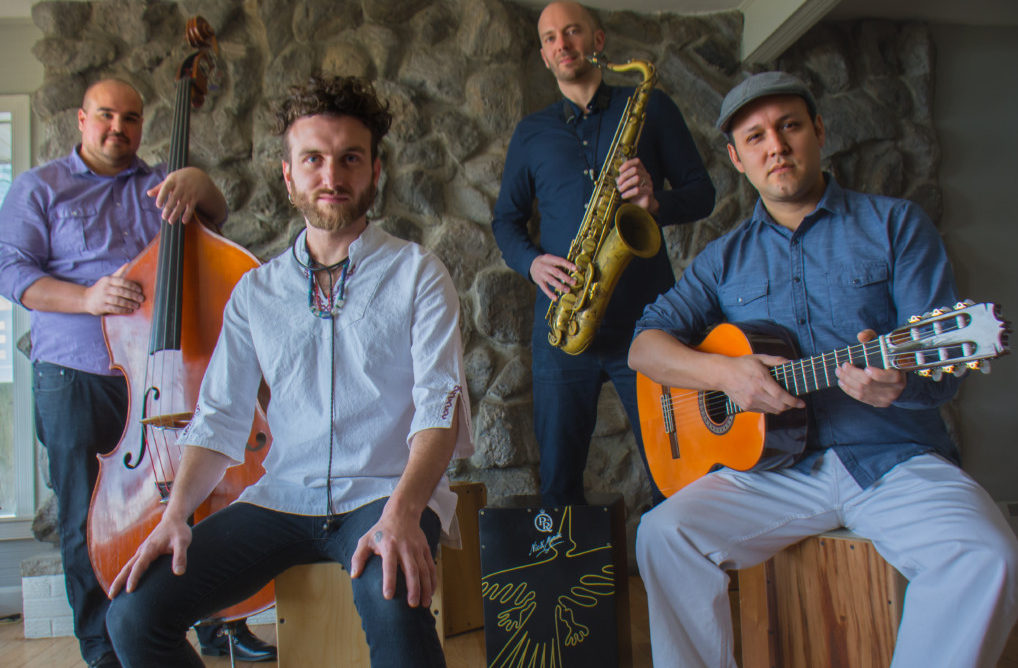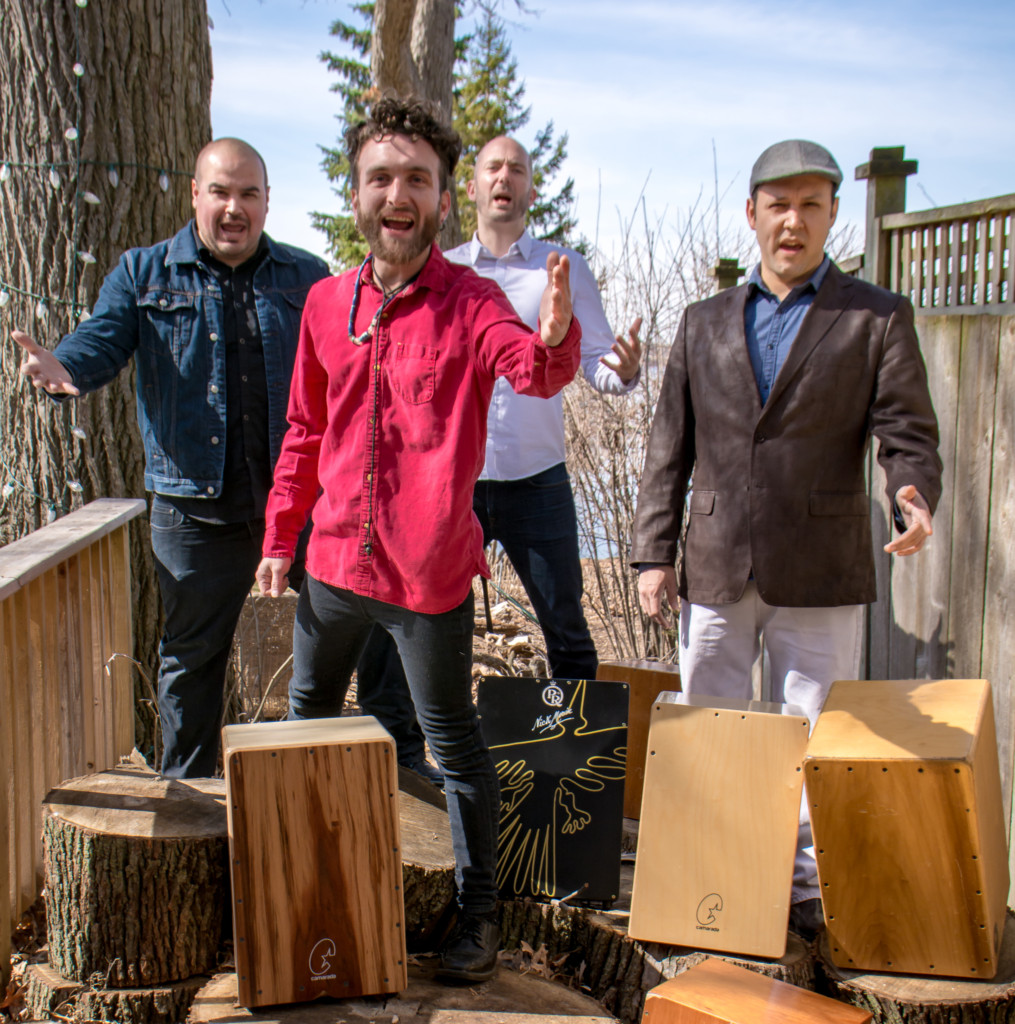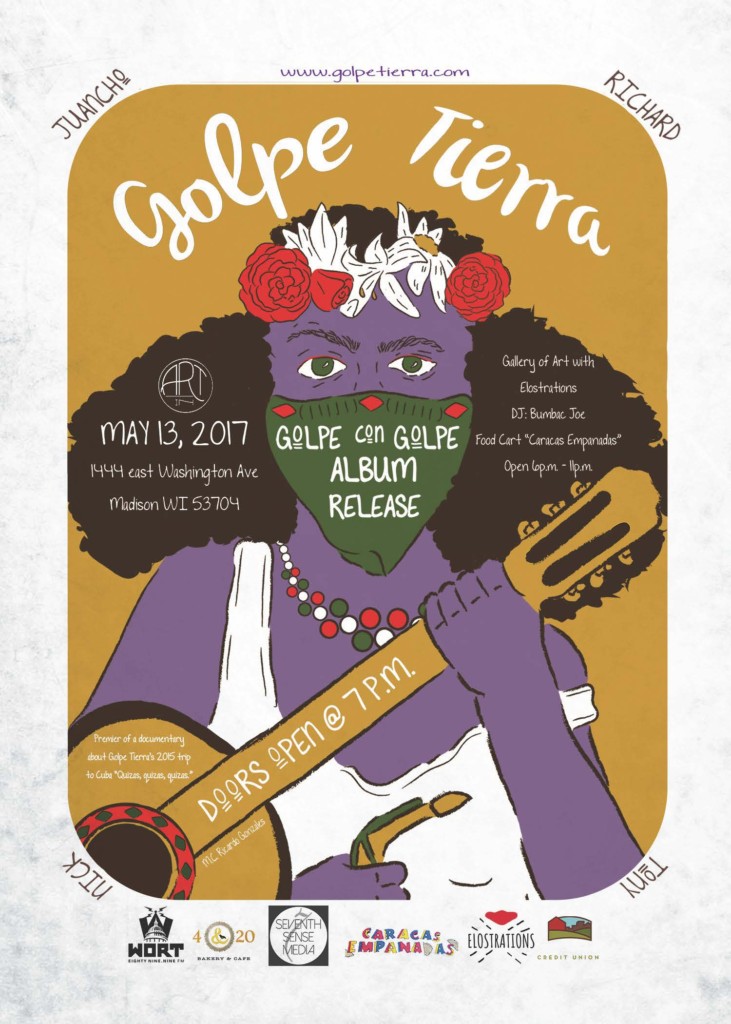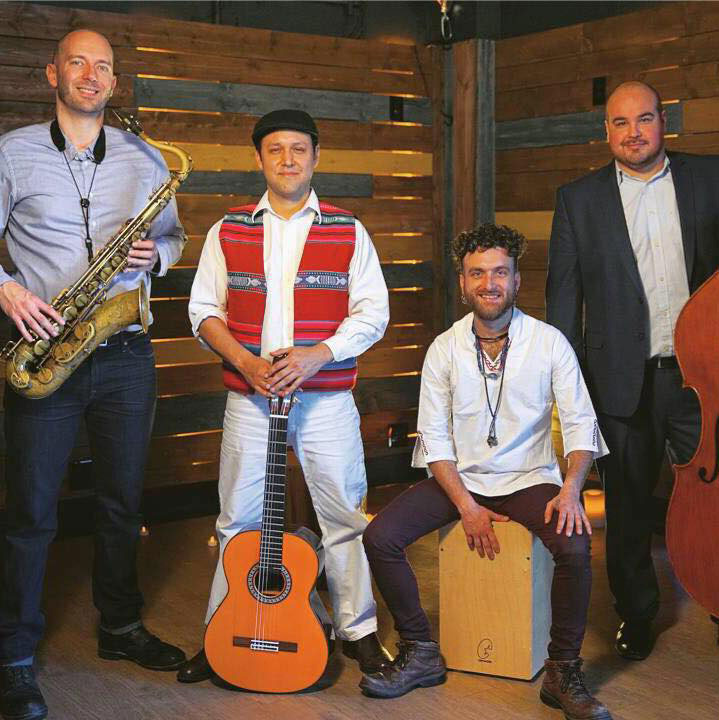Local band Golpe Tierra agreed to do an interview to talk about different aspects of the band and their new disc, “Golpe con Golpe”. As a lover of music and dance, I discovered the band by chance, on a typical day while searching for positive energy. I loved them not only because of the good music but also the charisma with which they all play! So it’s a great pleasure to talk to a local group that makes Art with a capital A. A true art, made of work and the will to make music. A group that deserves to be known and supported not only by La Comunidad News, but also all of the Madison community! Here at the Café Coda bar, listening to jazz, starts the interview with two of its members.

Tell me about your group, Golpe Tierra. Who forms it and how was the idea for the band born?
Richard: It all took shape in 2009. I had a Peruvian friend called Juan Daniel Pastor that was living in Chicago. We got together and played once in Chicago, but didn’t make anything of it. Later, Juan Medrano “Cotito” (musician, composer, master of the Peruvian Cajón and marvelous singer) came, and myself and Nick Moran (other members of the band) accompanied him. Through this process we began to learn about Afro-Peruvian music, because he’s a big scholar of this type of music. One of his topics of study is called “golpe tierra”, an old dance from an Afro-Peruvian community in the north. That’s where the name was born. Later, Juan Daniel went to Chicago and we kept playing with Juancho, who’s already a big cajonero with a background playing Spanish music. We began to shape the band playing more original tracks, connecting our own ideas with Afro-Peruvian music.

What kind of music do you play?
Juancho: It’s a mix of where we all came from, of our roots, our parents, the music we like and what we grew up with. So it’s a genre of music from anywhere, with a Peruvian base. A genre that isn’t made much anymore, that we’re rescuing.
What message do you want to transmit with your music?
Richard: Well, we want to transmit the idea that this is music that can be defined as art. It’s original music that maintains its roots so that they’re not lost. We want to continue transmitting the music that our parents inherited and not allow it to die. The name also lies in the name of the band: when we all beat on the ground, with our feet and our hands, we feel united into one big community where we’re all equal. This is an important message, that of being together and sharing the same things in a world that, sometimes, is difficult to survive in if we do it alone.
What influences (not just musical) do you each have and how does it influence the music of the group?
Juancho: I think it’s influenced a bit by how each of us are. We’re all pretty different, but we’re deeply connected through music. We really like the project that we’re working on and it moves us. Personally politics really influences me, as well as current events and history. I try to bring ideas from how I feel, and the energy that I put into things. The songs that we’ve made for the CD are full of this, and I’m always throwing a little more in there. What’s going on around us and in the world influences me a lot. I spend a lot of time reading about it.

Richard: In my case, having grown up here in Madison, my influence is my family, my grandfather and my uncles that play the guitar. They play Andean music. That was my first love, and I began to learn more about music. Now we’re listening to Charlie Parker, for example, who’s one of the group’s influences and in the kind of music we make. Carlos Aire and Juan Medrano Cotito as well, all Peruvian music. Each of these masters is like a brother, they’re part of the family, and they’re within the music the group makes. I think that playing this kind of music is a way to survive culturally in an environment where it can be hard, because it’s within another culture. Being here, in the United States, if we don’t do this, we go crazy!
Tell me about your new disc, “Golpe con Golpe”. How was the project born? Why that title?
Juancho: “Golpe con Golpe” can be interpreted within the Spanish-speaking community in many different ways. It can evoke beating when you’re playing an instrument, strikes when someone strikes you and you strike them back, it’s a meaning that can be taken in different ways. The CD is named this way because one of the songs in the CD is called “Golpe con Golpe’ and is about what we’re doing, in regards to musical concepts and ideologies. It talks a bit about the band, a bit about its sound, some about the project and it has a lot of musicality in it. Beats and more beats and more beats are what we want to make.
Richard: Someone goes “Pim,” another goes “Pum,” and we’re communicating rhythmically. It’s a form of communication, a desire for being able to do everything all at once. To feel Charlie Parker’s music, and play Peruvian music at the same time. All at once. Because otherwise your body misses it and demands it!
How difficult is it to make good music and art in a city like Madison? What role does a place like Café Coda play and how important is it that places like it exist to provide support?

Richard: To me, to Juancho, to many of us that are here, it’s really important. But for many folks out there, on the outside, it’s not important at all. This is the reality of the situation, but it’s so nice to find moments where you feel like there’s a lot of people that think like you. That there’s a lot of allies, and even people that think like you! That end up thinking like you! And creating that is our mission. It’s hard to be a minority inside of a majority, in a country like the United States. We could talk about it all night!
Juancho: It’s hard to make this type of music in Madison. It’s because when you make this type of music that’s far from the environment where it’s from, you don’t know where to grab from. There’s a vacuum, so it’s like going against the current. You’re here, in the cold, with people that are really white and redheaded, making music of African origin and that passed through many years of colonization, so it’s really hard to do. But places like Café Coda create a really big connection and it opens up the need for this type of music to be shared. One of the countries with the most Latin American music is this country, the United States, since a whole ton of Latinos have left their countries to search for opportunities. The artist’s eternal search to get ahead, and in this country you can find tons of people with the same story. It’s normal to have the need to play this kind of music.
It’s not only hard in Madison, but in all parts of the United States. Bigger cities are in the same situation, but perhaps at a different scale. We’re all in the same fight, and we artists provide strength among each other. I have the good fortune of working with Latino children that were born here during the day, “Madisonians”, but they aren’t treated that way even though they feel like they’re an integrated member of this culture. This is the situation, and it’s difficult to create the conditions to develop “Golpe con Golpe”.
Where can we find information and news about the group, a website or social media?
Juancho: We have a website called http://golpetierra.com/ . We also have our facebook page, “Golpe Tierra”. You can find our contact information on facebook and stay up to date with the event we’re involved with.
Tell me about your CD release on May 13th.
Juancho: We love partying and having a good time, so we’re attempting to do something a little more open. We’re going to have an art exhibition with a Venezuelan artist, a DJ that was born in Lima, lived in Venezuela and now lives in Chicago, and we’re going to have Venezuelan food (the Venezuelan empanada food cart). We’ll also be playing. There will be dancing and we’ll be projecting a video, so we’re going to have a lot of different art mediums.
Richard: It’s cool because the location hosting the event is really used to doing this type of thing, since it’s focused on the arts.
Juancho: It’s going to be a night of culture, an overdose of culture and art that will make you leave from there in tune and feeling like a different person. The presentation of the CD will be the main act, it’s going to be a big celebration of our first recording. Everything made in house, a local product!
Richard: Art-In always houses experimental stuff. This is an experiment as well, we’ll see!
Thank you for your time! It was a pleasure to interview you!
Richard and Juancho: And thanks to you! It was a great interview! We’ll be happy to share it when it’s published.